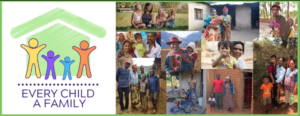Our vision
All children have the right to be children;
to grow up in a safe environment, to go to school and to develop their talents and gifts to the fullest.
Our mission
Adamfo Ghana contributes to a better future for street connected children and vulnerable youth in Ghana. To achieve this aim we support Ghanaian NGOs, CSOs en other initiatives that are working to improve living conditions, create access to education and health care, and contribute in other ways to a better future for street connected children and youth in Ghana.
Adamfo Ghana is signatory to the pledge ‘Every Child A Family’. This initiative calls on NGOs to support children within family-based care (contrary to an orphanage or other form of institutional care). Since our founding, family-based care has been our main guiding principle in getting children off the streets. All our activities are geared towards reintegrating children within their families and local communities and supporting children within a family setting.
Our strategy
Although street children are often considered as helpless, in fact they have great potential:
They want to learn and be educated
They are very creative in finding solutions
They know how to survive and are used to difficult circumstances
They are capable of organizing themselves
They have a great sense of solidarity among themselves and towards the poor.
Street children are therefore the first and most important resource to reach our aim. Our strategy is to work with the children, not for them. The children are powerful in analyzing their situation, the problems they are facing and in finding background information for possible solutions. We believe that the long-term answer is three-fold:
Firstly, every child should grow up in a safe home and environment. Children living on the streets should therefore be supported to return to their family or alternative home-setting (with a guardian).
Secondly, real change lies in accessible education (formal education and informal vocational training) and increasing chances of getting employment (internships, on-the-job-training, setting-up packages).
Finally, the empowerment of street-connected children and their families is crucial, so that they are aware of their rights and able to advocate for themselves.
It is only when the Ghanaian authorities and decision makers take up the responsibility of finding sustainable solutions for ‘streetism’, that hopefully one day our work will become unnecessary.
Our core values
1) Commitment to serve the interests of (street)children and youth; their direct and indirect interests are the focus of our projects and work.
2) Local ownership, active participation and consultation of the target groups; involvement of the (street)children and local communities in project planning and development is essential.
3) Team work, cooperation and openness towards external organizations; rather than competing, we aim to work together with other organizations towards our common goals.
4) High standards of integrity, accountability and transparency; being accountable means to be open not only about successes but also about failures and difficulties along the way.
5) Sustainability; being a learning organization and focusing on projects that become self-sustaining and durable institutions on the long-term.




